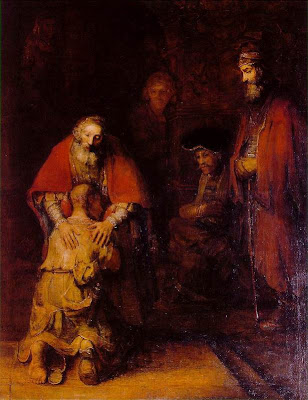“No Longer Worthy”
Luke 15 is my favorite chapter in the entire Bible because it contains one of the most famous parables of Jesus, The Prodigal Son.
It’s a parable that many are familiar with. It begins with a father who has two sons. The younger son demands his portion of the inheritance while his father is still alive and then takes the money he receives, moves to a distant country and squanders all he has on riotous living. With all his money gone, he is forced to take a job working with pigs until he finally comes to his senses and decides to return to his father, realizing that even the servants in his father’s house enjoy better lives than he currently has. But when the son returns home, his father greets him with open arms and celebrates his return with a feast. The older son resents the warm reception that his younger brother receives, but is rebuked by his father:
But a while back while reading the parable, I was struck by something I had never thought about before. In Luke 15.21, when the Prodigal returns to his father, he launches into the speech he has prepared:
I feel very similar sometimes when I run from God, when I commit sin and then return to Him.
But it’s not the proper mindset to have.
Not because the unworthiness aspect is inaccurate—certainly we are unworthy of being God’s children. No, the inaccuracy comes from the words “no longer” which imply that at some point we were worthy of being God’s children, and that simply isn’t true.
The Prodigal Son wasn’t a son because he somehow earned or deserved that relationship, but because he was born into it, and his father chose to treat him as a son whether he deserved it or not.
Similarly, our relationship with God doesn’t depend on our worthiness, it depends on His love. We are not his children based on how much good we’ve done, but based on His willingness to have a relationship with us at all.
We feel guilty when we stumble, and we rightly feel that we don’t deserve a relationship with our Heavenly Father. But we must remember that we never deserved that relationship in the first place.
That’s the great thing about God—He loves us despite our unworthiness.
It’s a parable that many are familiar with. It begins with a father who has two sons. The younger son demands his portion of the inheritance while his father is still alive and then takes the money he receives, moves to a distant country and squanders all he has on riotous living. With all his money gone, he is forced to take a job working with pigs until he finally comes to his senses and decides to return to his father, realizing that even the servants in his father’s house enjoy better lives than he currently has. But when the son returns home, his father greets him with open arms and celebrates his return with a feast. The older son resents the warm reception that his younger brother receives, but is rebuked by his father:
“‘My son,’ the father said, ‘you are always with me, and everything I have is yours. But we had to celebrate and be glad, because this brother of yours was dead and is alive again; he was lost and is found.’”It’s a wonderful parable, and there are a multitude of lessons that can be learned from it: the freedom that God gives us to leave Him or follow Him, His eagerness to welcome us back and forgive our sins, the perils of being the older brother, the false promises of the “far country”, and more.
But a while back while reading the parable, I was struck by something I had never thought about before. In Luke 15.21, when the Prodigal returns to his father, he launches into the speech he has prepared:
“‘Father, I have sinned against heaven and against you. I am no longer worthy to be called your son.’”The son describes himself as “no longer worthy.”
I feel very similar sometimes when I run from God, when I commit sin and then return to Him.
But it’s not the proper mindset to have.
Not because the unworthiness aspect is inaccurate—certainly we are unworthy of being God’s children. No, the inaccuracy comes from the words “no longer” which imply that at some point we were worthy of being God’s children, and that simply isn’t true.
The Prodigal Son wasn’t a son because he somehow earned or deserved that relationship, but because he was born into it, and his father chose to treat him as a son whether he deserved it or not.
Similarly, our relationship with God doesn’t depend on our worthiness, it depends on His love. We are not his children based on how much good we’ve done, but based on His willingness to have a relationship with us at all.
We feel guilty when we stumble, and we rightly feel that we don’t deserve a relationship with our Heavenly Father. But we must remember that we never deserved that relationship in the first place.
That’s the great thing about God—He loves us despite our unworthiness.
















4 comments:
I enjoy relating to God as the Father, but I think I often forget that we have always been His children, even before we acknowledged His love.
Alex,
Although no metaphor is perfect (especially when it comes to describing God), I think the idea of God as a father is helpful.
I particularly like the image of Luke 15, where God is the father eagerly awaits the return of His son and runs to meet him.
Very insightful...I certainly had never thought of it that way.
I really love this passage, too.
Sarah,
Thanks for commenting and for the compliment.
Luke 15 is great—the imagery and implications of the Parable of the Prodigal Son are amazing to me.
Post a Comment